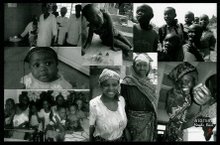
A sneaky picture I took of a carrot lady on the street… I didn’t get away with it. A shopkeeper saw me and made a scene to warn the woman, who ran away. Very embarrassing for the tourist-y mzungu…
Early on Tuesday morning (the 2nd) we had a visit from Beatrice, who brought us a gift – sandals decorated with beads and seashells that her mother had purchased for us in Nairobi. I am blown away time and again by the generosity of the people in this country. We have found ourselves a dear friend in Beatrice and are very grateful for her kindness to us. After Beatrice left, Alison and I walked to Mabatini to purchase yogurt for the orphanage as we were unable to deliver last Friday due to project obligations in town. We stayed for a little while and had a very interesting conversation with a local woman named Natalie who works as a clinical pastoral counsellor in Mabatini’s parish. She first studied at the convent to be a nun, was later trained as a nurse, and then travelled to Kingston, Jamaica, and Manhattan for coursework to develop her skills in pastoral counselling. She expressed her desire to return to school to study sociology, but worries that she’s too old now (she’s only in her 40s). I found it very interesting to see such a positive example of a woman who has changed the path of her life several times to remain fulfilled in the work that she does… certainly something that has become more common in today’s society. We set off for Bwiru after a very long wait for a ride (45 minutes), dropped off the yogurt at the orphanage and continued on to the Saba Saba fairgrounds to check in on the mamas working at the trade fair. Afterwards, we took the dala-dala back into town for lunch, groceries and our Swahili class. Post-dinner, Alison and I spent some time excitedly perusing our travel books, planning out the travelling we hope to do before coming home to Canada.

The Tukwamuane women manning their booth at the trade fair.
Wednesday (the 3rd) was a classic example of how difficult it can be to be productive in this city. Alison and I got up early with intentions of beating the line at the ATM in town (no such thing as “fast cash” in Mwanza). A raging thunderstorm forced us to reschedule, so we did some work from home and hosted the usual handful of visitors before setting out to town. We walked to NBC where we usually bank and waited in line for the ATM, only to find that neither of our transactions was going through. Attempts to solicit help from the bank tellers were unsuccessful, so we walked back north to Stanbic Bank, where Ruben and Claire bank. We waited there for another 30 min or so before that ATM broke completely. We walked back into town in search of another bank, and while Alison was making some changes to her cell phone plan, I bumped into our travel agent who informed me that everything was down in the city because of the storm and wouldn’t be back online for at least an hour. Alison and I decided that we would save more time by waiting out the effects of the storm in town, so we sat down for an hour over tea and conversation with some locals at the pizzeria. It’s kind of nice to be forced into these kinds of connections with local culture, as it can be easy to miss when we’re busy and on the go. We ventured back to NBC after a while and waited in what had become a typically long afternoon line, with great hopes that we’d be able to complete our transactions – no such luck! Unfortunately, we had no success at Stanbic when we returned again.
After spending more than half a day attempting to take out money, we moved on to the internet, prepared our English lesson and walked to Mabatini to teach. We stayed after the lesson to work through the monthly bills with the mamas. We tried to advise them about reinvesting some of their profit into the business in various ways, and though they seemed receptive, it’s hard to know what changes will be implemented. The language barrier can be really frustrating when it obstructs us from executing the necessary changes to move the project forward. Though everything will eventually be accomplished, it’s often hard to be patient! On Wednesday night, Alison and I planned to go out for dinner with Beatrice to say goodbye to her as she heads back to Dar es Salaam for school. We headed out 2 ½ hours past the time we had agreed to meet (Beatrice had some last minute errands to run). After an obligatory hour and a half of waiting for food, we received our dinners at 11pm sharp. It was difficult to say goodbye to Beatrice who has been so wonderful to us during our time here, but I’m sure we’ll maintain contact over the months and years to come.
Mamas Joyce and Elisabeth working on their English lessons.
On Thursday (the 4th), we worked from home in the morning before setting out to do a second day of battle with the city’s ATMs. Our first attempt at Stanbic didn’t work out, and we waited (extremely nervously) in line at NBC for our turn. Thankfully, it worked this time - I don’t think I’ve ever been happier to hear the whirring of cash being dispensed! We stopped at the travel agency and officially booked our flights to Zanzibar for early November. I finalized plans at a different agency for my upcoming safari in the Serengeti and Ngorongoro Crater after the faculty visits in mid-October. Lots of exciting things to look forward to! In the afternoon, we spent time updating our finances, working on some WHE reports, and then walked to Isamilo for our Swahili lesson. We’ve progressed to general conversation (about topics as varied as the problem of street children in Mwanza, the pros and cons of consuming carbohydrates, and the roles of men and women in Tanzanian culture), and although our grammar is progressing relatively slowly (2-4 concepts a week), we’re able to keep up in conversation with our teacher, which is very exciting! From class, we went to Tunza for our weekly yoga class and archery lesson with the Maasai.
We had a busy morning on Friday (the 5th) as we tried to fit all our work into a half day to accommodate for our Thanksgiving weekend plans. We prepared the mamas’ English test (Alison’s artistic side is becoming very useful as we have started to give the mamas pictures from which to practice their sentence composition) and delivered it to the kitchen. We took our weekly yogurt delivery to the orphanage in Bwiru and spent a couple hours with the children. These kids really are one of the highlights of my week… I love spending time with them. I can’t say enough positive things about how wonderful the environment of the orphanage is for their development and health.
A swinging Bahati (which translates to “luck” in Swahili).
We came home in the early afternoon and I received a call from Ellena, a former WHE intern who is currently orchestrating the faculty’s visit from UWO. During our conversation, I inquired about the ‘consultant’ who she kept referring to, and found out that the project is hosting an international consultant next week to review the project and survey the area for development. This came as a big surprise to Alison, Ruben and I, but I’m confident that we’ll be able to pull ourselves together in time to be good hosts.
Alison and I packed for the weekend and set off to town to meet Janine, Henk and Claire, who we travelled with to Buhimba, a small town about 3 hours north of Mwanza. We had been invited there to stay at a gold mining camp with some South African miners (Boela aka “Tiny”, Hannes, Roy, Chris and Arthur) who we have befriended in town. As we drove north (past the familiar sign for Kijereshi tented camp), the landscape began to roll into hills and valleys, sparsely populated with mud hut villages. Eventually, we turned onto a road of rich red soil and passed through many small villages with a vibrant magenta sunset at our backs. We arrived at the heavily guarded camp (necessary to protect against occasional ambushes from illegal miners in the area) and were amazed to find a sprawling compound of houses surrounding a swimming pool and central lodge that looked like it belonged in the Swiss Alps. We were set up in one of the empty houses (complete with a full kitchen, hot water and potable cold water straight from the tap!) and joined the miners in the main lodge for dinner.

A farmer driving his herd outside of the Serengeti.
Over the weekend, we learned a lot about the gold mining industry and were able to venture out for a tour of the mining pits and processing plant. The Buhimba mine is no longer in production (as such, the camp is empty aside from the SA men), but it was still very impressive to see the set up and get an idea of the scale of their work – every ton of ore that is processed yields only 3-5 grams of gold. The mining pits remain open as the Tanzanian government does not require them to be refilled after use, which would cost the company millions of dollars to complete. As we peered over the edge of the pit, we watched a massive herd of cattle and goats be driven towards the rain- and ground-water reservoir at the base of the quarry to drink… clearly the locals have found ways around the security and are still able to use the land as a resource. On a hill across the valley, you could clearly see a camp of illegal miners who process ore themselves, working tirelessly for about 2000 TSH a day (about $1.50 CDN). The government knows about these miners but doesn’t do anything about them for one reason or another. We ventured up to the top of the area where waste minerals are dumped and were treated to a magnificent view of the valley below, where we could see a thunderstorm rolling in across the horizon. Thanks to our generous hosts, Alison and I certainly felt like we ate more than enough to celebrate Canadian Thanksgiving. We felt very lucky to be able to spend time with such kind-hearted people while we were missing our family and friends at home!
Looking out on the rolling hills of Africa from Buhimba.
On Sunday morning (the 7th), we joined the men for “church” in the mess hall where Roy read Biblical passages to the group, and a ‘family’ lunch before we hit the road to come back to Mwanza. We arrived in the late afternoon and spent our evening getting ourselves together for the week ahead. Ruben will return home tomorrow from a weekend away from the city, visiting small villages near Bunda with a friend. We look forward to the busy weeks ahead, full of visits from consultants and faculty, before we commence our big travels within Tanzania.

A conundrum in the sky as a storm rolls in to Buhimba.





No comments:
Post a Comment